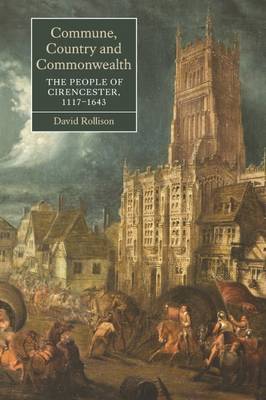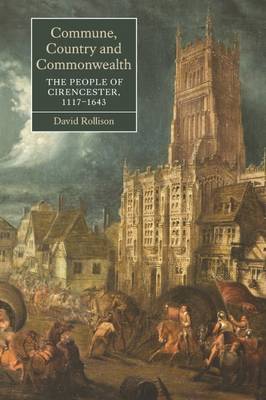
- Afhalen na 1 uur in een winkel met voorraad
- Gratis thuislevering in België vanaf € 30
- Ruim aanbod met 7 miljoen producten
- Afhalen na 1 uur in een winkel met voorraad
- Gratis thuislevering in België vanaf € 30
- Ruim aanbod met 7 miljoen producten
Zoeken
€ 209,45
+ 418 punten
Omschrijving
Makes original contributions to late medieval and early modern historiography, including detailed, contextualized studies of the 'Lancastrian revolution', the Reformation and the English Revolution. Commune, Country and Commonwealth suggests that towns like Cirencester are a missing link connecting local and national history, in the immensely formative centuries from Magna Carta to the English Revolution. Focused on atown that made highly significant interventions in national constitutional development, it describes recurring struggles to achieve communal solidarity and independence in a society continuously and prescriptively divided by grossinequalities of class and status. The result is a social and political history of a great trans-generational epic in which local and national influences constantly interacted.
From the generation of Magna Carta to the regicides of Edward II and Richard II, through the vernacular revolution of the 'long fifteenth century' and the chaos of state reformations to the great revival that ended in the constitutional wars of the 1640s, the epic was united by strategic location and by systemic, 'structural' inequalities that were sometimes mitigated but never resolved. Individual and group personalities emerge from every chapter, but the 'personality' that dominates them all, Rollison argues, is a commune with 'a mind of its own', continuously regenerated by enduring, strategic realities. An afterword describes the birth and development of a new, 'rural' myth and identity and suggests some archival pathways for the exploration of a legendary English town in the modern and postmodern, industrial and post-industrial epochs. DAVID ROLLISON is Honorary Research Associate in History, University of Sydney. DAVE ROLLISON isHonorary Research Associate in History, University of Sydney.
From the generation of Magna Carta to the regicides of Edward II and Richard II, through the vernacular revolution of the 'long fifteenth century' and the chaos of state reformations to the great revival that ended in the constitutional wars of the 1640s, the epic was united by strategic location and by systemic, 'structural' inequalities that were sometimes mitigated but never resolved. Individual and group personalities emerge from every chapter, but the 'personality' that dominates them all, Rollison argues, is a commune with 'a mind of its own', continuously regenerated by enduring, strategic realities. An afterword describes the birth and development of a new, 'rural' myth and identity and suggests some archival pathways for the exploration of a legendary English town in the modern and postmodern, industrial and post-industrial epochs. DAVID ROLLISON is Honorary Research Associate in History, University of Sydney. DAVE ROLLISON isHonorary Research Associate in History, University of Sydney.
Specificaties
Betrokkenen
- Auteur(s):
- Uitgeverij:
Inhoud
- Aantal bladzijden:
- 296
- Taal:
- Engels
- Reeks:
- Reeksnummer:
- nr. 10
Eigenschappen
- Productcode (EAN):
- 9781843836711
- Verschijningsdatum:
- 20/10/2011
- Uitvoering:
- Hardcover
- Formaat:
- Genaaid
- Afmetingen:
- 155 mm x 236 mm
- Gewicht:
- 657 g

Alleen bij Standaard Boekhandel
+ 418 punten op je klantenkaart van Standaard Boekhandel
Beoordelingen
We publiceren alleen reviews die voldoen aan de voorwaarden voor reviews. Bekijk onze voorwaarden voor reviews.











